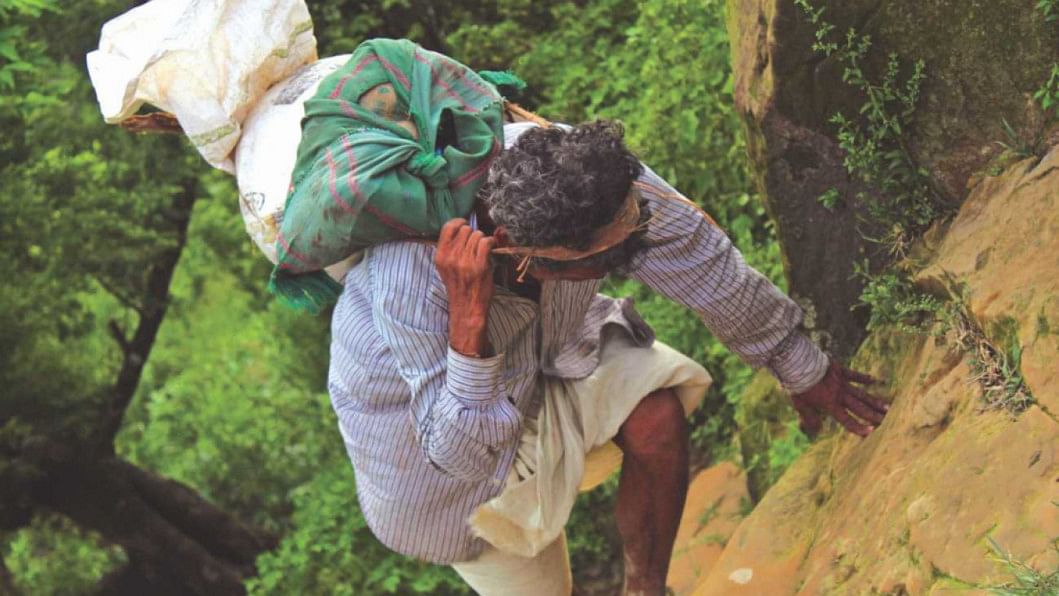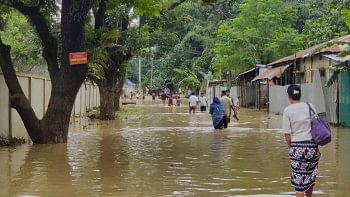A call for moral tourism in CHT

While Bangladeshis frequently express solidarity with oppressed communities around the world, the Indigenous communities of the Chittagong Hill Tracts (CHT) at times remain overlooked in their ongoing struggle for recognition and rights.
While places like Cox's Bazar and Sylhet are the most visited places among tourist attractions, the CHT region has seen many tourists over the last decade. The sprawling hills and the different rivers that wind through the valleys offer views that mesmerise the eyes. Thus, it is not unfair to assume that tourist groups nowadays are considering exploring locations within the CHT for their next adventure. However, these exquisite tourist locations, such as Sajek Valley, Kaptai Lake, and Bandarban, carry the dark past of the Indigenous communities; behind all the beauty of the region, the pain of their suffering quietly lingers.
The Indigenous communities have experienced oppression in different forms, including arson attacks and forced evictions. For instance, on the night of February 19, 2010, arson attacks targeted 200 Pahari households in the Baghaihat area of Sajek union in Rangamati. Furthermore, in Bandarban's Nilgiri, many Mro and Marma families from six villages were evicted to make way for resort developments. There have been countless instances of such "land-grabbing" cases.
While these spots are spellbinding and major contributors to the tourism sector, they certainly raise questions about our morals when we visit these places; thereby, indirectly supporting this expulsion. Does exploring these places bring out the "righteousness" we readily claim to uphold as per our captions on social media awareness posts? Aren't we tacitly approving of these evictions? Our double standard is glaringly evident in this case. We lay significant emphasis on equality and equity, yet we almost invariably turn a blind eye to the persecution that has been going on for decades in these regions. This ignorance reflects a massive gap in awareness about these matters. Nevertheless, among young tourists—a major portion of visitors to these regions—there appears to be a fair level of cognisance. Despite this, the pursuit of adventures almost always supersedes moral considerations.
If we want to be "morally correct," our actions should align with what we stand for. Thus, we should carefully weigh our decision before booking a ticket to one of these places. Well, these might prompt knee-jerk remarks like "these spots are remarkably contributing to the tourism sector," which is absolutely true. Nonetheless, that is not an apt response, given the fact that we are dealing with moral principles. Morality addresses right and wrong based on ethical principles, irrespective of economic gains. The question I am asking is: whether or not these so-called "trivial" moral aspects should be considered. If we can stop consuming Coca-Cola for its endorsement of Israeli aggression in Palestine, the continuation of travelling to these spots solely for pleasure is, by no means, morally justifiable. Well, it's true that the situation might not change much if we stop going to these places, and no one might not effectively benefit from that. However, there are various ways through which we, as individuals, can contribute to making things better for the Indigenous communities, thereby not only staying true to our morals but also focusing on the greater good of the society.
To begin with, one of the easiest ways to ensure a morally responsible trip is to stay at a hotel or resort that was built on undisputed land, ensuring no displacement of the local population. Besides, we can follow the path often adopted by some adventure lovers, such as staying with the Indigenous communities in their traditional machang homes. These homes, built on elevated platforms, offer the best experience, providing picturesque views and a serene environment. This also gives travellers an opportunity to understand the sufferings of the Indigenous communities, fostering empathy. However, many travellers may feel unsafe, or find such arrangements inaccessible, rendering this impactable for many. Alternatively, we can integrate them into the workforce of this growing tourism sector to ensure peaceful and sustainable livelihoods for them.
If achieving such option is not viable, we can contribute to community-led initiatives aimed at improving the livelihoods of the Indigenous communities. While it is very easy to list all the measures that can be adopted, the ground reality is very different, and execution often poses challenges. If all else fails, and if we get the chance during our trip, we can still leave a mark by sitting with them, sharing stories, learning from their resilience, and recognising the humanity that binds us all beneath the surface.
Azwad Bin Karim is a content writer.
Views expressed in this article are the author's own.
Follow The Daily Star Opinion on Facebook for the latest opinions, commentaries and analyses by experts and professionals. To contribute your article or letter to The Daily Star Opinion, see our guidelines for submission.

 For all latest news, follow The Daily Star's Google News channel.
For all latest news, follow The Daily Star's Google News channel. 





Comments